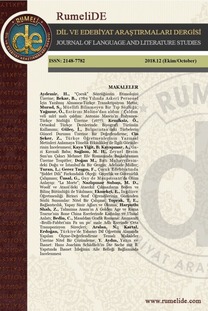Kavramsal metafor kuramı ve belagat: karşılaştırmalı bir inceleme
Bu çalışmada, Lakoff ve Johnson’ın 1980 yılında
yayımlanan Metaphors We Live by adlı eseriyle ilk kez literatürde
ifadesini bulan Kavramsal Metafor Kuramı’nın kaynak alan, hedef alan,
metaforik dilsel ifade, haritalama, yapısal metafor, ontolojik metafor, yönelim
metaforları, motivasyon, bedensel gerçekçilik, algıya dayalı yapısal
benzerlik, deneyimde korelasyon, ana sahne gibi temel kavramları
açıklanmakta, belagat geleneğinde metaforun mukabili olan istiare hakkında
söylenenlerle çağdaş metafor kuramının ilkeleri mukayese edilmektedir. Ahmed
Hamdi Şirvanî (Orak 2013), Ahmed Cevdet Paşa (1323), Recaizade Mahmud Ekrem
(1299), Tahir Olgun (1936), Walter Andrews (1976), Yekta Saraç (2015) kaleme
aldıkları belagat kitaplarında ve Doğan Aksan (1978) anlambilimle ilgili
kitabında metaforu a) dille ilgili bir mesele olduğu, b) retorik bir araç
olduğu, c) benzerliğe dayandığı konusunda genel bir uzlaşı hâlindedirler.
Halbuki Kavramsal Metafor Kuramı’na göre metafor; a) düşünceyle ilgili bir
meseledir, b) bilişsel bir süreçtir ve c) benzerlik dışında başka
motivasyonlara sahip olabilir şeklinde açıklanmaktadır. Makalede bu üç konu
belagat kitapları ve Kavramsal Metafor Kuramı literatürü açısından
karşılaştırmalı olarak incelenmiştir.
Anahtar Kelimeler:
Kavramsal Metafor Kuramı, metafor, istiare, belagat, dil-düşünce ilişkisi
Conceptual metaphor theory and rhetoric: A comparative study
In this study, Conceptual Metaphor Theory, which
was first expressed in the literature by Lakoff and Johnson in 1980 with their
book Metaphors We Live by. In the book the concepts like source, target,
metaphorical linguistic expression, mapping, structural metaphor, ontological
metaphor, orientation metaphors, motivation, embodied realism, perceived
structural similarity, correlation in experience and primary scene are
explained, and the principles of contemporary metaphor theory are compared with
what is said about metaphor that corresponds to “istiare” in rhetoric
tradition. Ahmed Hamdi Şirvanî (Orak 2013), Ahmed Cevdet Pasha (1323),
Recaizade Mahmud Ekrem (1299), Tahir Olgun (1936), Walter Andrews (1976), Yekta
Saraç (2015) and Doğan Aksan (1978) define metaphor as a) a matter of language,
b) it is a rhetorical tool, c) it is based on similarity. However, according to
Conceptual Metaphor Theory, metaphor; a) is a matter of thought, b) is a cognitive
process, and c) may have other motivations other than similarity. In this
article, these three subjects are examined comparatively in terms of classical
rhetoric books and Conceptual Metaphor Theory literature.
Keywords:
Conceptual metaphor theory, metaphor, figure, rhetoric, language-thought,
___
- Ahmed Cevdet Paşa (1323), Belagat-ı Osmaniyye, İstanbul: Şirket-i Mürettibiyye Maatbaası. Akarsu, B. (1998), Wilhelm Von Humboldt’da Dil-Kültür Bağlantısı, İstanbul: İnkılap Kitabevi. Aksan, D. (1978), Anlambilimi ve Türk Anlambilimi, Ankara: Erol Ofset Matbaacılık. Akşehirli, S. (2005), “Çağdaş Metafor Teorisi”, http://www.ege- edebiyat.org/modules. php?name=Downloads&d_op=getit&lid=111. 10.02.2019. Andrews W. G. (1976), An Introduction to Ottoman Poetry, Minneapolis: Bibliotheca Islamica. Deutscher, G. (2013), Dilin Aynasında, Çev: Cemal Yardımcı, İstanbul: Metis Yayınları. Grady, J. E. (1999), "A Typology of Motivation for Conceptual Metaphor: Correlation vs. Resemblance", Metaphor in Cognitive Linguistics içinde, eds. Raymond Gibbs & Gerard Steen, ss. 79-100, Amsterdam/Philadelphia: John Benjamins Publishing Company Heidegger, M. (1993), Basic Writings, ed. David Farrell Krell, New York: HarperCollins Publishers. Kövecses, Z. (2010), Metaphor - A Practical Introduction, New York: Oxford University Press. Lakoff, G. (1990), Women, Fire, and Dangerous Things: What Categories Reveal about the Mind, Chicago and London: University of Chicago Press. Lakoff, G. (1993), "Contemporary Theory of Metaphor", Metaphor and Thought içinde, ed. Andrew Ortony, ss. 202-252, Cambridge: Cambridge University Press. Lakoff, G. & Johnson, M. (1980), Metaphors We Live by, Chicago: Chicago University Press. Lakoff, G. & Johnson, M. (1999), Philosophy in the Flesh: The Embodied Mind and Its Challenge to Western Thought, New York: Basic Books. Orak Yılmaz, K. (2013), Belâgat Geleneğimiz ve Belâgat-i Lisân-ı Osmânî, İstanbul: Kitabevi. Olgun, T. (1936), Edebiyat Lügati, İstanbul: Âsâr-ı İlmiye Kütüphanesi Neşriyatı. Recaizade Mahmud Ekrem (1299), Talim-i Edebiyyat, İstanbul: Mihran Matbaası. Pinker, S. (2007), The Language Instinct, New York: HarperCollins Publishers. Saraç, M. A. Y. (2015), Klâsik Edebiyat Bilgisi: Belâgat, İstanbul: Gökkubbe Yayınları. Turner, M. (2000), Death is the Mother of Beauty: Mind, Metaphor, Criticism, Christchurch: Cybereditions. Whorf, B. L. (1956), Language, Thought and Reality, ed. John B. Carroll, Cambridge and Massachusetts: The MIT Press. Wittgenstein, L. (2002), Tractatus Logico-Philosophicus, trans. D. F. Pears & B. F. McGuinness, London and New York: Routledge.
- ISSN: 2148-7782
- Yayın Aralığı: Yılda 6 Sayı
- Başlangıç: 2014
- Yayıncı: Yakup YILMAZ
Sayıdaki Diğer Makaleler
Joseph Conrad’ın Altın Ok ve Halide Edip Adıvar’ın Handan isimli eserlerinde “Yeni Kadın”
Âşûrâ Vak‘ası ve Hz. Hüseyin'in (as) kıyamının Fars şiirine etkisi: Safevî’den günümüze
Edebiyat ve sosyoloji ilişkisi bağlamında alegorik ve gerçekçi rejim eleştirisi
Harnâme’nin yapı unsurları ve muhteva bakımından incelenmesi
Türkçe eğitiminde eleştirel dinlemenin/izlemenin önemi ve yeri
Edirne Valisi Ahmed İzzet Paşa Divançesi
Orhun Yazıtlarındaki atasözü ve deyimlerin günümüzdeki karşılıklarına yönelik inceleme
